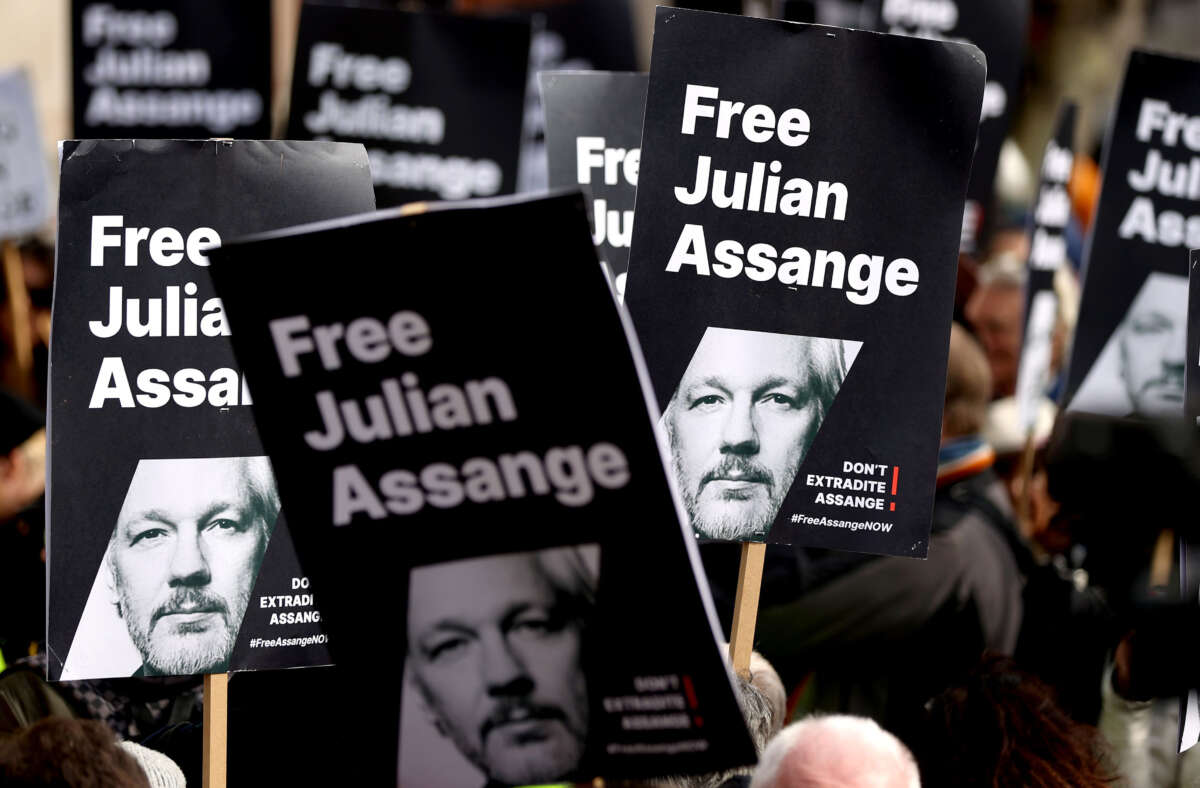Support justice-driven, accurate and transparent news — make a quick donation to Truthout today!
Julian Assange, a journalist who faced 175 years in prison for publishing evidence of U.S. war crimes, has agreed to a plea deal with the U.S. government, ending years of imprisonment in the United Kingdom where he awaited extradition and allowing him to live in freedom.
The WikiLeaks founder was charged under the Espionage Act under the Trump administration, which alleged that he had illegally obtained and disseminated U.S. government materials relating to U.S. atrocities in Iraq and Afghanistan, as well as the private communications of diplomats — information that had been leaked by then-Army intelligence analyst Chelsea Manning, and that was shared by news organizations like The New York Times and The Guardian without repercussions.
Among the many documents Assange published through Wikileaks were the “Iraq War Logs,” which exposed 15,000 previously unreported killings of Iraqi civilians, as well as systematic rape, torture and murder by a “notorious Iraqi torture squad” that was created and supported by U.S. forces.
Wikileaks also published the “Guantánamo Files,” secret reports containing evidence that 150 innocent people had been imprisoned for years at Guantánamo Bay, and the horrific 2007 “Collateral Murder Video,” which shows a U.S. Army Apache attack helicopter targeting and killing 11 civilians, including two Reuters journalists and a man who was attempting to rescue the wounded.
The Biden White House also sought to have Assange extradited to the U.S. to face charges, giving no assurances to the U.K. that Assange wouldn’t face the possibility of execution upon being convicted. A U.K. court subsequently granted Assange the right to appeal his imprisonment in May, although it was unclear for what reason it had done so.
A spokesperson for the National Security Council indicated that President Joe Biden had no input in the deal.
“This was an independent decision made by the Department of Justice and there was no White House involvement in the plea deal decision,” that person said.
The plea deal that Assange has agreed to means that he will admit guilt to one felony count of illegally obtaining and sharing national security material. Assange will be sentenced to around 62 months in prison, but will be granted his freedom as the court is expected to deem his five years in British prison — which were spent in a small cell in near-total isolation — as “time served.” Prior to his imprisonment in the U.K., Assange spent seven years in the Ecuadorian embassy under what a United Nations Work Group deemed to be arbitrary detention.
Assange will make the plea at a courthouse in the U.S. territory of Saipan, Northern Mariana Islands, avoiding extradition to the U.S. mainland. That courthouse is also much closer to his home country of Australia, where he is expected to go following the hearing.
Assange’s spouse, Stella Assange, is currently waiting in Australia for the proceedings to conclude with the couple’s two young children. She described herself as “elated” and unsure whether the deal was really set to happen the day before it was announced.
Stella Assange also indicated that her husband would seek a pardon after the plea deal was accepted, stating that the case’s outcome was troubling for the future of press freedom.
“The fact that there is a guilty plea, under the Espionage Act in relation to obtaining and disclosing National Defence information is obviously a very serious concern for journalists and national security journalists in general,” she said in a statement.
The news of Assange’s freedom was celebrated by journalists and human rights advocates around the world.
“Julian Assange was persecuted by the US for one reason alone: he exposed the crimes of US imperialism,” British journalist Owen Jones wrote on X. “It’s the US butchers of Iraq and Afghanistan who should have been jailed, not the ones — like Assange and Chelsea Manning — who exposed the crimes.”
The American Civil Liberties Union (ACLU) also celebrated the outcome, but warned that the case could set a dangerous precedent for press freedom.
“Exposing government secrets and revealing them in the public interest is the core function of national security journalism. Today, for the first time, that activity was described in a guilty plea as a criminal conspiracy,” Ben Wizner, director of the ACLU Speech, Privacy, and Technology Project, said in a statement. “And even if the current Department of Justice stays true to its assurances that the Assange case is unique and will not provide a precedent to be wielded against other publishers, we can’t be confident that future administrations will honor that commitment.”
Press freedom is under attack
As Trump cracks down on political speech, independent media is increasingly necessary.
Truthout produces reporting you won’t see in the mainstream: journalism from the frontlines of global conflict, interviews with grassroots movement leaders, high-quality legal analysis and more.
Our work is possible thanks to reader support. Help Truthout catalyze change and social justice — make a tax-deductible monthly or one-time donation today.
